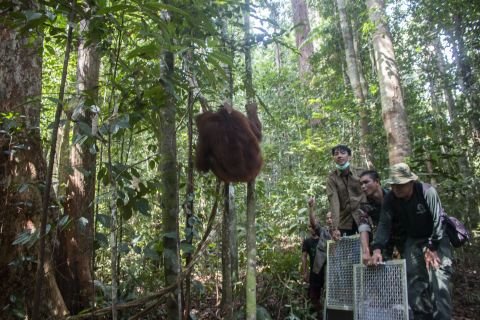
Four orangutans have been released into The National Park of Bukit Baka Bukit Raya (TNBBBR) in West Borneo by our team in cooperation with the Natural Resources Conservation Centre (BKSDA.) These four orangutans are named Amy, Ongky, Kepo and Rambo. The release is the second release operation in 2018. The first release took place in February this year.
Amy is a female orangutan of about six years old from Jambi, Sukamarau, Central Kalimantan. Amy was rescued from the hands of the residents villagers in February 2017. She was in a thin, untreated, and dirty condition, living in a wooden cage and with a chain round her neck. When the medical team conducted a physical examination, there were abrasions in the neck area.
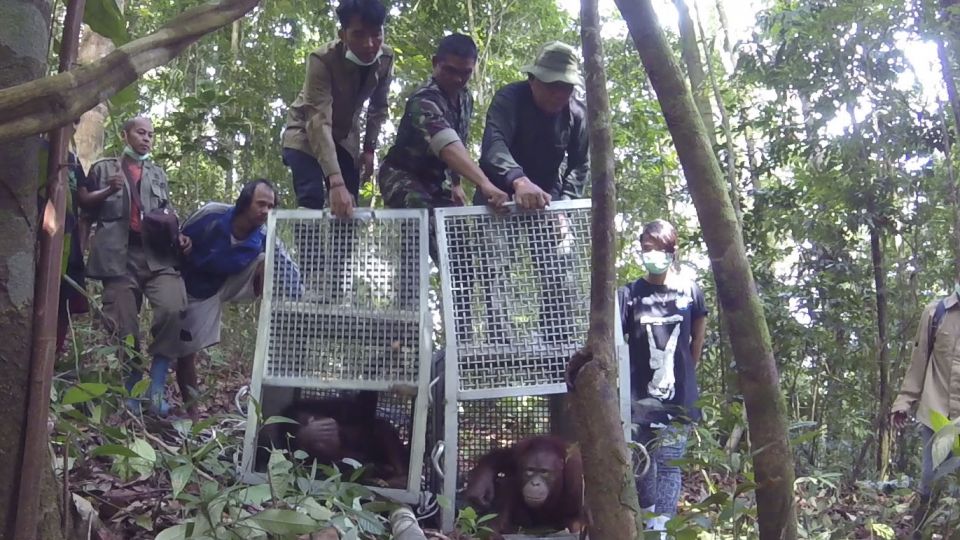
Kepo is a six year old female orangutan rescued by the West Kalimantan BKSDA in October 2018. When rescued, Kepo was three years old.
Ongky was confiscated by the Forest Police Rapid Response Unit in June 2010. Ongky was found in a poor condition, was not active and didn’t want to eat because of stress. Our team flew to Pontianak in Indonesia to provide first aid and bring Ongky to our rescue centre in Ketapang for further treatment.
Rambo is a male orangutan rescued by International Animal Rescue in May 2015. He was being kept as a pet in very poor conditions.
The four orangutans have finished undergoing rehabilitation and are confirmed to be ready to return to their natural habitat. Director of IAR Indonesia, Karmele Sanchez said, ” This rehabilitation process is carried out to restore the natural nature of orangutans.
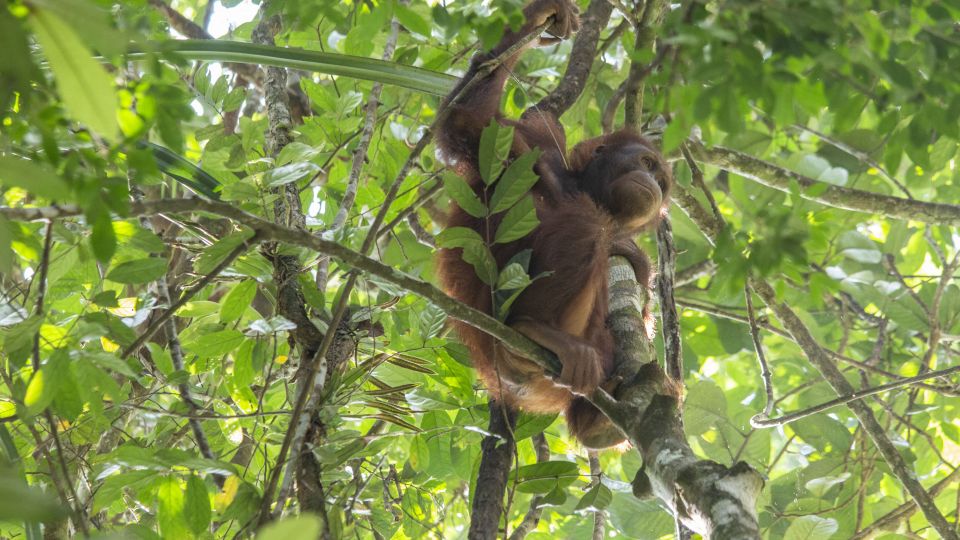
Orangutan babies should live with their mothers from birth until they reach the age of six to eight years. At that time, baby orangutans learn all the skills they need to survive in the wild as orangutans. Because these baby orangutans have been taken from their mothers, they must learn the ability to survive such as climbing, looking for food and making nests in rehabilitation centres. “
This rehabilitation process can take a lot of time and money. IAR Indonesia currently accommodates more than 100 orangutans to be rehabilitated.
The rehabilitation process is also not short. It can take 7-8 years depending on the capabilities of each individual. Kepo and Ami do not need to stay long in the rehabilitation centre because they have mastered various abilities to survive in the wild. Ongky’s condition is now much better than before when he was rescued.
Currently Ongky has mastered various abilities to survive in nature including climbing, foraging, and making nests. Based on the data in the behavioural report, we can ensure the four orangutans are ready to return to freedom.
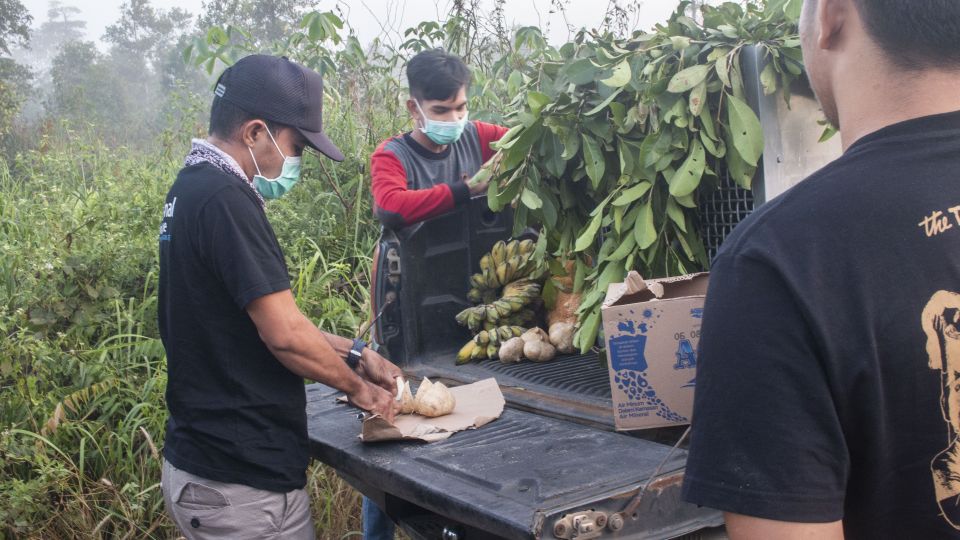
The release team departed from our rehabilitation centre in Ketapang on 12 September 2018 at 0400. While on the journey the team paid constant attention to the condition of the orangutans so they didn’t experience stress in the cage considering the very long distance.
It took around 18 hours for the team to reach the office of Bukit Baka Bukit Raya National Park in Nanga Pinoh. The team rested one night before continuing on to the point of release.
The journey continued the next morning to the nearest hamlet to the TNBBBR area. Overland travel takes as long five hours and then was followed by a journey by motorboat for as long as one hour. Then the journey continued on foot to the edge of the forest TNBBBR.
Porters consisting of dozens villagers around TNBBBR were ready to carry each cage that weights a minimum of 100 kg and 150 kg. The journey to carry this cage takes up to five hours. The four orangutans are then placed in a habituation cage so they can rest and adapt a little to the new environment. The next day the team continued the journey on foot and the four orangutans were released at two different release points.
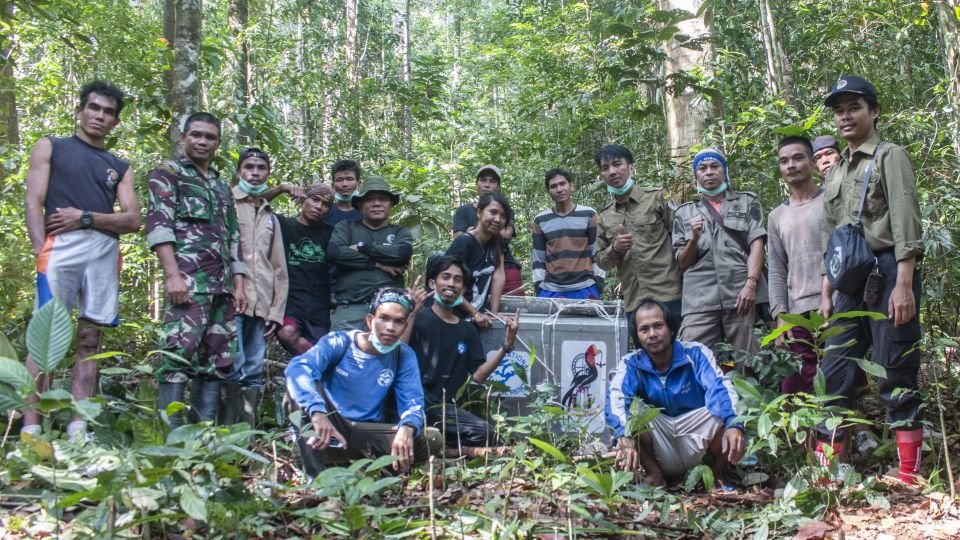
Bukit Baka Bukit Raya National Park was chosen as the place for orangutan release because the forest is still natural and good. Surveys by the our team also show the number of abundant trees for the orangutans to feed on.
In addition, its status as a national park area will be better able to protect this orangutan and its habitat as a conservation area. From a study that was also conducted by a team of our experts, at the site of the TNBBBR resort Mentatai, the orangutan release site, orangutans had been declared to be extinct as none had been found in the last 20-30 years. Therefore, efforts to release orangutans are very important.
Programme Director of IAR Indonesia, Karmele L. Sanchez said: “IAR Indonesia is also committed to providing assistance to the community from Nusa Poring and Mawang Mentatai so together we can conserve forests and orangutans, and manage forests sustainably. By keeping orangutans, forests and the communities around TNBBBR we can provide a balance between nature and humans because both of them need each other.”
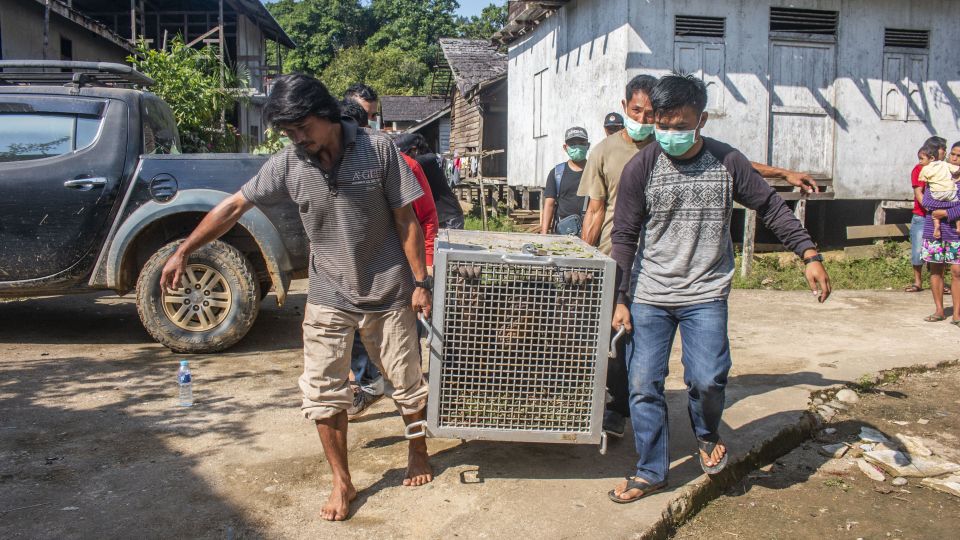
Head of Bukit Baka Bukit Raya National Park (TNBBBR), Ir. Heru Raharjo, M. P., supporting the release effort in TNBBBR and said, ” TNBBBR has been collaborating with IAR since March 10, 2015 on this Orangutan Reintroduction Programme.
This is an excellent effort considering based on the surveys of habitat and potential feed sources, the park fulfils the requirements as a release place. We will continue to hope that the orangutans have been released could form a new population of wild orangutans in West Kalimantan TNBBBR region. In the long run, hopefully this population can continue to breed and can maintain the quality of our forests. “
Head of the West Kalimantan Alama Resource Conservation Agency, Sadtata Noor added:
“Our appreciation and gratitude go to partners like IAR who never stop contributing to conservation in Kalimantan Barat. Conservation work like this should be done together. We hope that this kind of concern will expand not only in conservation activists but also to all levels of society. Congratulations on returning home to Amy, Ongky, Kepo and Rambo. May your life be peaceful. “

